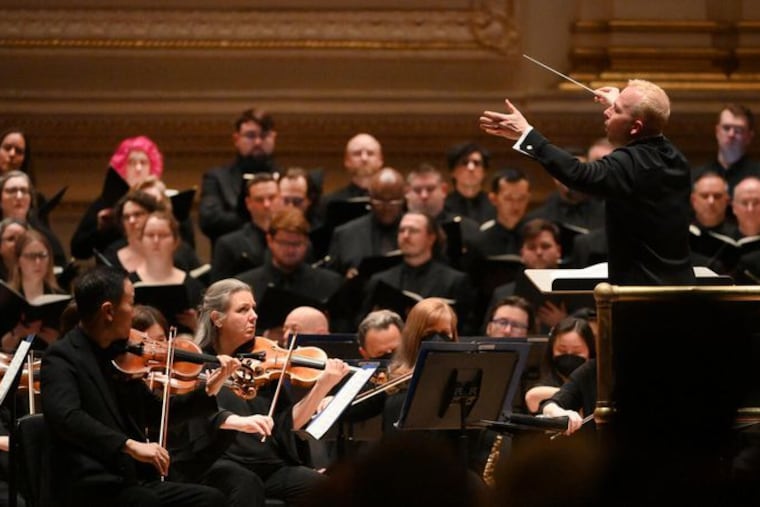Philadelphia Orchestra’s Beethoven successfully migrates to Carnegie Hall — without the high-tech special effects
Troubles that beset the Philadelphia Orchestra’s Thursday night Kimmel Center performance of "Missa solemnis" were absent.

NEW YORK — A friend writes: “What’s the world coming to when Beethoven’s Missa solemnis needs visuals???” Well, respite was on the way.
Troubles that beset the Philadelphia Orchestra’s Thursday night Kimmel Center performance of Missa solemnis — the storm-related power surges, the deeply controversial computer-generated imagery by video artist Refik Anadol — were absent in the Carnegie Hall outing on Friday. It’s here that listeners had a chance to take in what the orchestra, music director Yannick Nézet-Séguin and its quartet of soloists had to truly tell us in a music-only presentation of Beethoven’s gargantuan, provocative, endlessly layered choral work that, in the right kind of performance, can challenge your world view in the best possible way.
Scheduled before lockdown as the climax to the Philadelphia Beethoven symphony cycle, the concert was postponed, rescheduled and became yet another packed-to-the-rafters Carnegie Hall event — as part of the parallel artistic life that conductor and orchestra have, here in what many Philadelphians call “our most interesting suburb.”
In contrast to Nézet-Séguin’s speed-demon Beethoven Symphony No. 9 in February at Carnegie Hall that wasn’t always singer friendly, this performance showed him unleashing the music more than managing it, aiming higher but exerting less overt control over the piece than in Wolfgang Sawallisch’s 2001 performance with the orchestra. In contrast to the lean, historically authentic performances often heard in Europe, this Beethoven didn’t look for resolution in its many ill-fitting pieces, but was big, bracing, sometimes beautiful, sometimes thorny — more an existential experience than a religious one. More than usual, faith and disillusionment existed side by side.
Starting with the grave, slow-ish tempo of the opening “Kyrie,” the elemental nature of the performance somehow kept reminding you that Beethoven was not some musical god, but an arguing, anguished individual who was attempting to reconcile the spiritual possibilities of his inner life with the inhumanity of his outer world.
And aren’t we all these days?
One key moment in the performance was concertmaster David Kim’s treatment of the famous violin solo during the “Benedictus.” This wasn’t some consoling voice from on high but a plea for humanity, very much of the earth, and was some of the most eloquent playing I have yet heard from him.
More important was the special dramatic underpinning in the final section of Missa, in which pleas of “Grant us peace” are often interrupted by militaristic percussion — a battle of elements that reaches no true resolution. The so-called war music — not the finest that Beethoven had to offer — is something that some past conductors secretly admit they would like to cut. On Friday, that section became crucial. What I heard was Beethoven throwing up his hands at the hopelessness of human self-destruction that has been such a constant in history, and that the only comfort is a battered God that helps us sift through our inner rubble.
The Philadelphia Symphonic Choir seemed transformed, under director Amanda Quist, from the group that sang a masked Handel’s Messiah at the Kimmel Center in December. The usual weak points in a chorus — the tenor section and the pianissimos — were the principal strengths, especially the pianissimos.
Curiously, the full-blooded, operatically inclined soloists — Jennifer Rowley, Karen Cargill, Rodrick Dixon, and Eric Owens, mostly familiar from other Nézet-Séguin outings — weren’t spread across the front of the stage but clustered at stage left. Clarity among the individual voices wasn’t in the cards. Instead, the quartet was an imposing mass of high-vibrato sound, framed at the top by Rowley’s formidable soprano and, at the bottom, by Owens’ wiry bass. Heard from the balcony, the soloists somehow created an acoustic that, in softer entrances, seemed to well up from an alternate world — a reminder that such alternative worlds are there for the finding.
Additional Philadelphia performances: Saturday at 8 p.m. and Sunday at 2 p.m. at the Kimmel Center. Tickets are $10-$170. philorch.org, 215-893-1999.